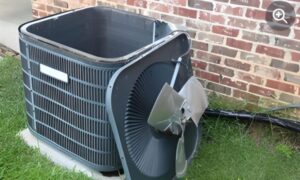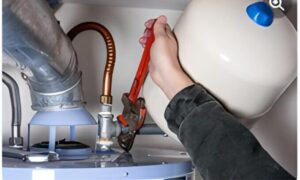In today's increasingly competitive business landscape, finding ways to boost profits and gain a competitive edge is paramount.
While there are numerous strategies and tactics that can be employed, one often overlooked aspect is the importance of expert air conditioning maintenance.
You may be wondering how air conditioning maintenance can actually contribute to your company's financial performance. Well, the truth is, it goes beyond just keeping your employees and customers comfortable.
By investing in regular maintenance, you can unlock a range of benefits that directly impact your bottom line. From energy efficiency and cost savings to extended equipment lifespan and improved employee productivity, the advantages are undeniable.
In this article, we will delve into the various ways expert air conditioning maintenance can help boost your profits and give you a leg up in the competitive market.
So, if you're eager to discover how this often overlooked aspect can make a significant difference to your business, keep reading.
Energy Efficiency and Cost Savings
Maintaining energy efficiency and achieving cost savings are essential for any business looking to optimize their HVAC system's performance. The HVAC system is responsible for nearly half of a building's energy usage, making it a critical area to focus on.
Regular air conditioning maintenance can help maintain up to 95% of the system's original efficiency. Without maintenance, a neglected HVAC system can lose up to 5% efficiency each year. Clogged air filters, dirty vents, and worn parts all contribute to increased energy consumption.
By conducting regular maintenance, businesses can ensure a clean and optimized system, resulting in significant energy savings. This not only reduces operational costs but also helps to minimize environmental impact.
Investing in energy-efficient practices and maintenance can yield long-term cost savings and improve overall sustainability for businesses.
Fewer and Less Costly Repairs
Regular inspections and preventative maintenance play a crucial role in reducing the frequency and cost of repairs for an air conditioning system. Here are four reasons why:
- Early detection: Regular inspections allow technicians to identify potential problems before they escalate into major failures. By addressing these issues promptly, costly repairs can be avoided.
- Coil cleanliness: Neglected maintenance can lead to the buildup of grime and debris on the condenser coil. A dirty coil causes the system to run longer, putting strain on the compressor and increasing the risk of failure.
- Broken parts: Without proper maintenance, worn parts can go unnoticed, leading to costly repairs and even emergency after-hours rates. Preventative maintenance ensures that these parts are inspected and replaced when necessary.
- Prevent major breakdowns: Regular maintenance helps keep the system in optimal condition, preventing major breakdowns. This saves money and minimizes disruptions to business operations.
Extended Equipment Lifespan
By implementing consistent and thorough maintenance practices, businesses can significantly prolong the lifespan of their air conditioning equipment. Regular maintenance keeps the various parts of the system in good condition, preventing premature wear and tear. This can extend the lifespan of an air conditioning unit by 1-5 years, saving capital by delaying the need for a new unit.
It also avoids the need for premature replacement and the associated costs. By investing in maintenance, businesses increase the return on investment for their air conditioning system. Additionally, prolonging the lifespan of the equipment reduces the environmental impact of frequent replacements and contributes to sustainability efforts.
With extended equipment lifespan, businesses can ensure uninterrupted cooling comfort and avoid the disruption and inconvenience of sudden breakdowns.
Improved Employee Productivity
With the extended lifespan of air conditioning equipment, businesses can not only ensure uninterrupted cooling comfort but also experience a significant boost in employee productivity. Here are four key ways in which air conditioning maintenance contributes to improved productivity:
- Comfortable workplace temperatures increase productivity: Office temperature is the number one complaint from workers. By maintaining a consistent and comfortable temperature, employees can focus better, resulting in higher efficiency and productivity.
- Warmer temperatures result in higher employee efficiency: When the office is too cold, employees may feel uncomfortable and struggle to concentrate. By keeping the temperature at an optimal level, air conditioning maintenance helps prevent errors and reduces distractions, leading to increased productivity.
- Low office temperatures cause more errors and reduced productivity: Studies have shown that excessively cold environments can negatively impact cognitive function, leading to more mistakes and decreased productivity. Regular maintenance ensures that the office temperature remains within the optimal range, minimizing errors and maximizing productivity.
- Regular maintenance keeps temperature consistent and comfortable: Neglected air conditioning systems can experience fluctuations in temperature, causing discomfort and distractions for employees. By conducting regular maintenance, businesses can ensure a stable and comfortable environment, allowing employees to work with focus and efficiency.
Increased Customer Satisfaction
Ensuring a consistently comfortable environment for customers is crucial for businesses to enhance satisfaction and drive profits. The level of customer satisfaction directly impacts a company's reputation and success.
By investing in regular air conditioning maintenance, businesses can provide a comfortable and pleasant experience for their customers. A well-maintained HVAC system ensures consistent temperature control, proper humidity levels, and clean indoor air quality. This helps to create a welcoming atmosphere that encourages customers to stay longer, return frequently, and recommend the establishment to others.
In turn, increased customer satisfaction leads to higher customer loyalty and boosts profits for businesses. By prioritizing air conditioning maintenance, businesses can create a competitive edge, strengthen their brand image, and maximize their revenue potential.
Boosted Profits Through Maintenance
Regular air conditioning maintenance is a strategic approach that can significantly boost profits for businesses. Here are four ways in which maintenance can contribute to increased profitability:
- Energy Efficiency and Cost Savings: HVAC systems are responsible for nearly half of energy usage in commercial buildings. Regular maintenance helps maintain up to 95% of the system's original efficiency. Neglected systems can lose up to 5% efficiency each year without maintenance, leading to increased energy consumption and costs.
- Fewer and Less Costly Repairs: Regular inspections and maintenance catch potential problems before major failures occur. Neglected maintenance can result in condenser coil grime and debris buildup, leading to system inefficiencies and costly repairs. Preventative maintenance saves money and prevents major breakdowns.
- Extended Equipment Lifespan: Regular maintenance keeps system components in good condition, which can extend the lifespan of an air conditioning unit by 1-5 years. This saves capital by delaying the need for a new unit and avoids premature replacement costs.
- Improved Employee Productivity: Comfortable workplace temperatures increase productivity. Regular maintenance ensures consistent temperature control, leading to higher employee efficiency and reduced errors. A comfortable environment keeps employees satisfied and motivated.
The Importance of Regular Inspections
Conducting routine inspections is crucial for ensuring the optimal performance and longevity of an air conditioning system. Regular inspections help identify potential issues before they escalate into major problems, saving both time and money.
Neglecting maintenance can lead to the accumulation of grime and debris on the condenser coil, resulting in reduced efficiency and even compressor failure. By addressing these issues early on, businesses can avoid costly repairs and emergency breakdowns.
Moreover, regular inspections help keep all parts of the system in good condition, extending the lifespan of the air conditioning unit by 1-5 years. This not only saves capital by delaying the need for a new unit but also increases the return on investment for the air conditioning system.
Ultimately, investing in regular inspections ensures a comfortable environment, improves employee productivity, increases customer satisfaction, and boosts profits for businesses.
The Return on Investment of Maintenance
What is the quantifiable impact of investing in air conditioning maintenance on the overall profitability of businesses?
The return on investment of maintenance can be significant, as it brings several tangible benefits:
- Energy Efficiency and Cost Savings: HVAC systems are responsible for nearly half of energy usage in businesses. Regular air conditioning maintenance helps maintain up to 95% of the original efficiency, while neglecting maintenance can result in up to 5% efficiency loss each year. Clogged air filters, dirty vents, and worn parts increase energy consumption, but regular maintenance ensures a clean and optimized system.
- Fewer and Less Costly Repairs: Regular inspections catch potential problems before major failures occur. Neglected maintenance leads to condenser coil grime and debris buildup, causing the system to run longer and potentially leading to compressor failure. Preventative maintenance saves money and prevents costly repairs and emergency after-hours rates.
- Extended Equipment Lifespan: Regular maintenance keeps parts in good condition, extending the lifespan of an air conditioning unit by 1-5 years. This saves capital by delaying the need for a new unit and avoids the need for premature replacement and associated costs. Ultimately, it increases the return on investment for the air conditioning system.
- Improved Employee Productivity: Comfortable workplace temperatures increase employee productivity. Regular maintenance keeps the temperature consistent and comfortable, addressing the number one complaint from workers. Warmer temperatures result in higher efficiency, while low office temperatures cause more errors and reduced productivity.
Investing in air conditioning maintenance not only improves energy efficiency and reduces repair costs but also extends equipment lifespan, enhances employee productivity, and ultimately increases customer satisfaction and profits.
Frequently Asked Questions
How Often Should Air Conditioning Systems Be Inspected and Maintained?
Air conditioning systems should be inspected and maintained regularly to ensure optimal performance and energy efficiency. Neglected maintenance can lead to decreased efficiency, costly repairs, and premature replacement, while regular maintenance extends equipment lifespan, improves employee productivity, and increases customer satisfaction and profits.
What Are Some Common Signs That an Air Conditioning System Is in Need of Maintenance?
Common signs that an air conditioning system is in need of maintenance include reduced cooling efficiency, unusual noises or odors, frequent breakdowns, and uneven cooling. Regular maintenance can address these issues and ensure optimal performance.
Can Regular Air Conditioning Maintenance Help Reduce Energy Consumption and Lower Utility Bills?
Regular air conditioning maintenance is crucial in reducing energy consumption and lowering utility bills. Neglected systems lose efficiency over time, leading to increased energy consumption. Proper maintenance ensures optimal performance, saving money and improving energy efficiency.
What Are the Potential Consequences of Neglecting Air Conditioning Maintenance?
Neglecting air conditioning maintenance can lead to decreased energy efficiency, more frequent and costly repairs, shortened equipment lifespan, reduced employee productivity, and decreased customer satisfaction. Regular maintenance is crucial for optimal system performance.
Are There Any Specific Maintenance Tasks That Can Be Performed by the Business Owner or Employees, or Is Professional Maintenance Always Necessary?
Professional maintenance is necessary to ensure the proper functioning and longevity of an air conditioning system. While business owners and employees can perform basic tasks like cleaning filters, professional expertise is required for comprehensive maintenance and advanced repairs.
Conclusion
In conclusion, expert air conditioning maintenance is crucial for businesses looking to maximize their profits.
By promoting energy efficiency and cost savings, reducing repairs and extending equipment lifespan, improving employee productivity, and increasing customer satisfaction, businesses can significantly boost their financial performance.
Regular inspections and maintenance provide a strong return on investment, ensuring that the air conditioning system operates at its optimal level and contributes to the overall success of the company.








